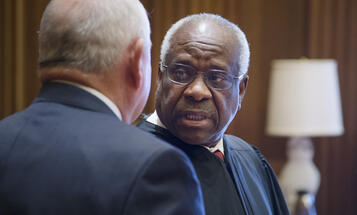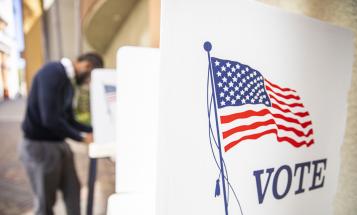
The Battle Hymn of the One Percent: Power from the Many to the Money
The U.S. Supreme Court has been friendly turf for the powerful, especially since Justice Alito joined Chief Justice Roberts to form a conservative majority block.
Is it a coincidence that we’ve seen attacks on three basic pillars of a nation in which we all have an equal say in our democracy and an equal chance in our economy: the freedom to vote, the right to band together collectively to speak with one (louder) voice, and protections against big money dominance of our elections?
I think we all know the answer. In a phrase every first year law student learns: res ipsa loquitur—“the thing speaks for itself.”
But, for those looking for the story spelled out, the folks at Democracy Initiative Education Fund, Communications Workers of America, and Every Voice Center have done so in a great recent report called Democracy at a Crossroads: How the One Percent is Silencing Our Voices.
The report outlines how the same big money interests who have worked to puncture the firewalls that should prevent them from translating economic might into political power have also been funding orchestrated attacks on free access to the ballot and collective bargaining rights.
The U.S. Supreme Court has been friendly turf for the powerful, especially since Justice Alito joined Chief Justice Roberts to form a conservative majority block. This January 30th was the 40th anniversary of Buckley v. Valeo, the severely damaging money in politics case that arguably helped launch the Inequality Era we’re experiencing now. Since then, the Court has gutted a key provision of the Voting Rights Act, consistently empowered corporations over working families, and more.
This is likely why Republican Senate majority leader Mitch McConnell and his allies have taken such extreme steps to protect the status quo—announcing just hours after Justice Scalia’s passing that the Senate would refuse to consider anyone the President nominates to replace him no matter how qualified.
But wealthy interests have pursued their concentration-of-power agendas in Congress and state legislatures as well, too often with success.
These attacks are not surprising. As Frederick Douglass said, “power concedes nothing without a demand.”
What’s inspiring is how much we’re winning in spite of the power amassed against ordinary Americans without big checkbooks to break out.
On the November 2015 ballot Maine voters strengthened their “clean elections” system, and Seattle voters created a first-in-the-nation “democracy vouchers” program to make four $25 contribution coupons available to every eligible donor.
And, pro-democracy activists are gearing up for strong 2016 campaigns to fight big money, clear away barriers to the ballot, and generally bring our democracy into balance.
This year will feature the most big money-dominated election in U.S. history. It may also be the year we take big steps towards building a democracy in which the strength of our voices isn’t determined by the size of our wallets.



